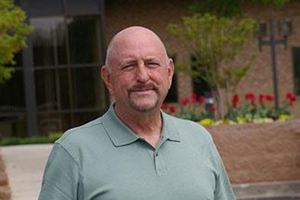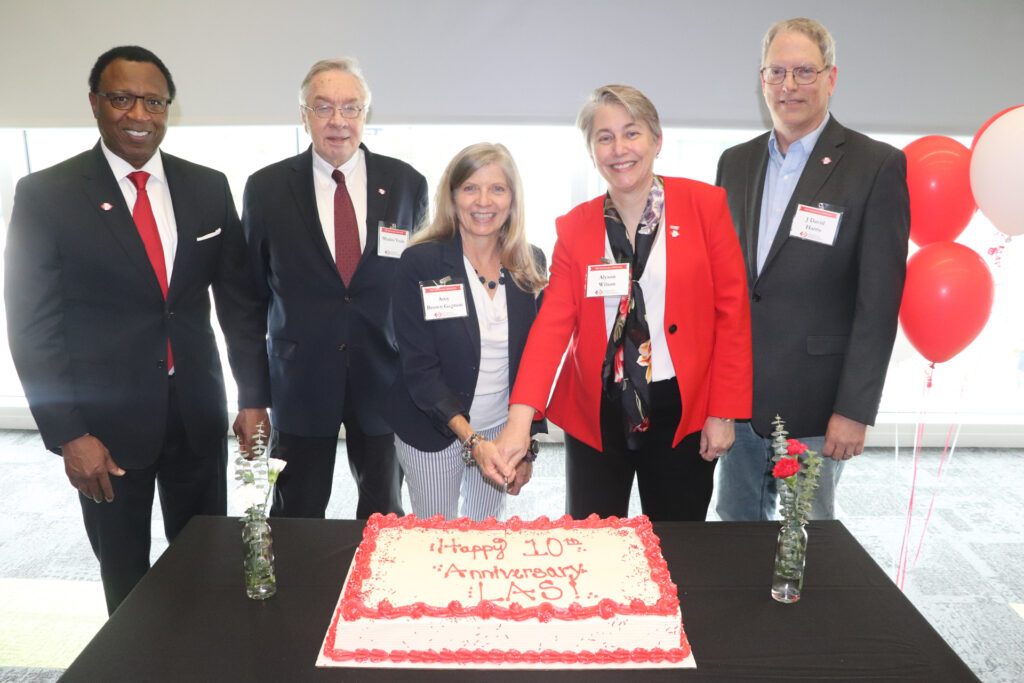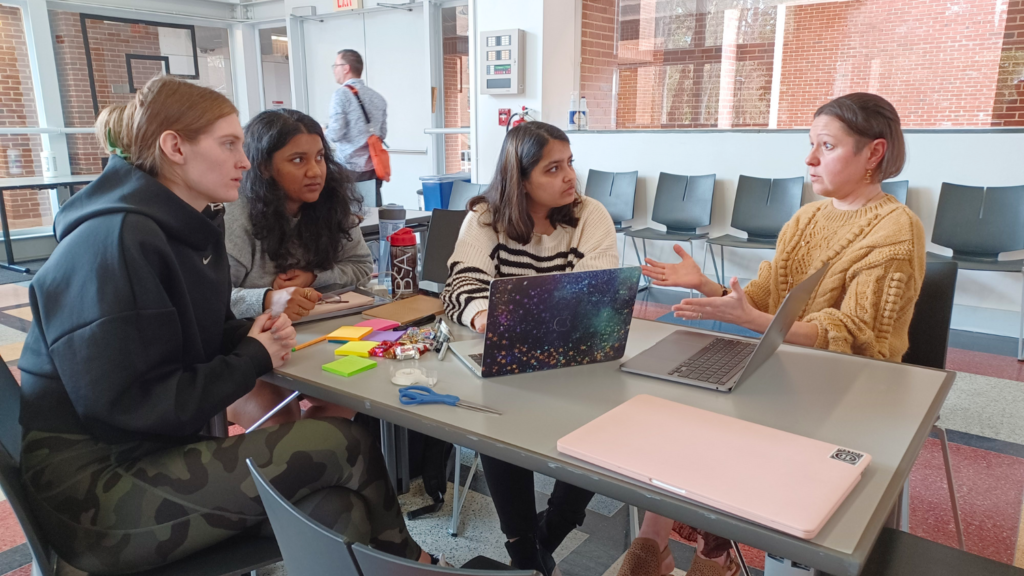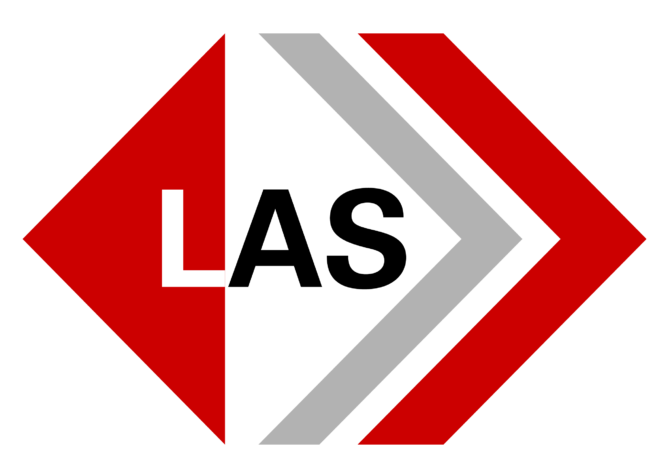History of LAS
Take a look at pivotal moments from the Laboratory for Analytic Sciences' 10-year history, and join us as we celebrate our journey forward.
A Decade of Improving Intelligence Analysis
Starting in 2007, National Security Agency (NSA) research staff were discussing the development of a cross-sector, interdisciplinary laboratory that would focus on data analysis. The idea came from the growing complexity of big data challenges, as well as the success of previous programs that brought scholars from different sectors together to work on solving a problem. In 2009, NC State Chancellor James Woodward and other university leaders had initial meetings with NSA Director of Research Mike Wertheimer and Jim Goodnight, CEO of SAS, to discuss the NSA’s vision for a data analysis lab at NC State.
2013
NC State and NSA agree that NC State will house the Laboratory for Analytic Sciences (LAS). A five-year contract is signed, a logo is created, and on May 13, the lab opens with four NC State staff and four NSA staff. The lab’s motto is “Reflect. Observe. Imagine.”
LAS welcomes J. David Harris as the lab’s first government director (Sept. 2013 – Sept. 2015) and Randy Avent as its first principal investigator (May 2013 – July 2014).
Government staff explore potential research partnerships for the lab by listening to elevator pitches from companies and faculty in departments from every college at NC State. UNC-Chapel Hill and Duke University also host pitch events.
NC State staff provide funding to the lab’s first group of academic and industry research partners, referred to as collaborators. NSA staff make sure the research is relevant to the agency’s mission. Teams begin identifying analogous problems that exist in both classified and unclassified data spaces to further enable collaboration across sectors.
LAS’s first set of projects focus on defining grand challenge problems across a variety of domains. Teams of faculty, industry experts, and government analysts and researchers collaborate to identify key questions in data quality and veracity; narrative processing; sensemaking; knowledge representation; instrumenting and analyzing analytic workflows; analytic tradecraft; trust; and individual, group, and organizational decision making.
In August, NC State and NSA announce their partnership, with press coverage from local and regional news outlets.
- 2013 Research Themes: Analytics and prediction; analytic tradecraft and workflows; data quality and veracity; measuring analytic workflows; narrative processing for sensemaking
- 2013 Collaborators: 5 partner organizations, including 3 universities.
2014
On February 3, the sensitive compartmented information facility (SCIF) on NC State’s Centennial Campus receives official authorization for occupancy.
LAS sponsors its first workshop on human-centered big data research.
LAS hosts its first “integrees” – analysts from other intelligence agencies – from Canada and the United Kingdom.
On April 22, the lab hosts an open house ceremony. Guests include North Carolina Senator Richard Burr and NC State Chancellor Randy Woodson.
The lab brings on additional companies and faculty researchers to develop ideas into prototypes. One prototype is a computerized tool known as BEAST (Broadening and Enlightening Analytic Structured Tradecraft) that helps analysts recognize their own biases and be more scientifically rigorous when making rapid decisions.
Alyson Wilson becomes the lab’s second principal investigator.
LAS receives access to an enormous set of digitized 19th-century British newspapers through NC State English professor Paul Fyfe. Fyfe works with the lab on a data mining and digital humanities project focusing on image analysis in a large, non-indexed corpus (a collection of written texts). The project helps LAS get started in natural language processing – a linguistics subfield that helps computers communicate with humans in their own language.
Researchers build software for a journaling app to understand what resources analysts use to accomplish a given task and why they use them. The app clarifies how individuals and teams make sense of information, helps improve workflows and boosts user confidence in intelligence products.

Remembering Richard Tait (1959-2019) As a career Korean linguist for the NSA, Richard Tait had a passion for teaching other language analysts. When Tait arrived at LAS in 2014, he shaped the lab’s initial research themes, like using data analytics to help predict future events or behaviors in an operational environment. Tait was known for mentoring younger employees and innovating ways to improve operations throughout the intelligence community. His leadership in language translation with LAS’s NorthWolf project was recognized by the Office of the Director of National Intelligence with a National Intelligence Meritorious Unit Citation.
- 2014 Research Themes: Analytics and prediction; analytic tradecraft and workflows; data quality and veracity; individual, group, and organizational decision making; interdisciplinary collaboration; knowledge representations; measuring analytic workflows; narrative processing for sensemaking
- 2014 Collaborators: 10 partner organizations, including 3 universities, and participants representing Canada, the U.K. and the U.S.
2015
The director of the National Security Agency, retired Adm. Mike Rogers, visits LAS in February.
Michael Bender joins LAS as the lab’s second government director (Sept. 2015 – Oct. 2020).
The lab sponsors a storyboarding workshop led by LAS collaborator Resilient Cognitive Solutions. Presenters use the analogy of a football coach and his team to explain how their software prototype can be used by a team of intelligence analysts. The prototype is a structured analytic tradecraft decision support system called Collaborative Critical Thinking Skills (CCTS).
Stephanie O’Sullivan, principal deputy director of national intelligence for the U.S., and Susan M. Gordon, deputy director of the National Geospatial Agency, visit LAS.
Kevin O’Connell, CEO of Innovative Analytics and Training, leads an anticipatory intelligence workshop for LAS. Similar to warning intelligence, anticipatory intelligence technology is used to forecast and reduce uncertainty about future events that may affect national security.
The lab holds its inaugural year-end research symposium to showcase the newest initiatives in machine learning, artificial intelligence, human-machine teaming, data triage, and interdisciplinary approaches to the unique national security challenges of the intelligence community.
Rick Ledgett, deputy director of the NSA, visits LAS.
LAS holds its first focused discovery activity (FDA), where government partners explore a particular technology or approach to see if it could work in an operational environment. The FDA is for a project called NorthWolf, which focuses on data normalization to support analytics and visualization.
- 2015 Research Themes: Analytics and prediction; analytic tradecraft and workflows; cybersecurity; data quality and veracity; interdisciplinary collaboration; knowledge representation; measuring analytic workflows; narrative processing for sensemaking; recommenders; supply chain
- 2015 Collaborators: 14 partner organizations, including 3 universities, and participants representing Canada, the U.K. and the U.S.
2016
The lab achieves some “firsts:”
- VENUS Cybersecurity, a Canadian organization, becomes LAS’s first non-U.S. industry collaborator.
- The lab sponsors its first senior design project (a capstone research project for small groups of graduating students) in collaboration with NC State’s computer science department. The project is called Hypothesis Tracking. Inspired by the multiple hypothesis tracking algorithm, the project focuses on methods for entity disambiguation.
- LAS launches its first call for white papers, a request for companies and faculty researchers to submit project proposals for funding. The call is followed by the lab’s first Collaborators’ Day, a day for faculty and companies to learn more about how their research and technology could be funded by LAS.
- Professor Sharon Joines, a collaborator from the NC State College of Design, holds LAS’s first design thinking workshop in the Hunt Library Data Visualization room.
The lab holds a focused discovery activity for OpenKE, a software product that crawls the web for open source information in a targeted, systematic fashion, and integrates it with classified information for analysis in mission-relevant contexts.
LAS receives a National Intelligence Meritorious Unit Citation from the Office of the Director of National Intelligence (ODNI) for the development and integration of data analysis technologies and tradecrafts to warn of emerging threats during the 2016 Olympic Games in Rio de Janeiro, Brazil.
LAS receives an Intelligence Integration Unit Citation from ODNI for Uncrewed Aircraft Systems (UAS).
- 2016 Research Themes: Analytic tradecraft and workflows; analytics and prediction; measuring analytic workflows; data quality and veracity; narrative processing for sensemaking; knowledge representation; interdisciplinary collaboration; recommenders; cybersecurity; anticipatory intelligence; analytic rigor; open source analysis; visual analytics; radicalization; organizational performance
- 2016 Collaborators: 15 partner organizations, including 5 universities, and participants representing Canada, the U.K. and the U.S.
2017
In January, the lab sponsors an anticipatory thinking workshop with Gary Klein, senior scientist at MacroCognition LLC. Klein defines anticipatory thinking as preparing for potential challenges and opportunities.
The lab changes its motto to “Collaborate. Innovate. Transform.”
The American Statistical Association selects LAS to receive its SPAIG Award. The award recognizes outstanding statistical partnerships between academia, industry and government organizations.
LAS researchers apply psychology methods and tools to discover predictors of political, social or religious radicalization. By studying the intersection of social and data sciences, researchers identify correlation of terrorism involvement and characteristics of women involved in jihadism-inspired terrorism.
In August, the lab sponsors a week-long workshop on structured analytic techniques. Twenty analysts from across the intelligence community learn how to externalize their internal thought processes, break down a problem into steps, apply techniques to help organize data, provide transparency to the analysts’ work, support effective communication, and avoid cognitive pitfalls by identifying and assessing alternative perspectives.
- 2017 Research Themes: Analytics and prediction; analytic tradecraft and workflows; anticipatory intelligence; attribution and inference for groups, organizations, and states; cybersecurity; illicit networks, trafficking, and fragile states; interdisciplinary collaboration; internet of things; knowledge representation; open source analysis; organizational performance; protecting critical infrastructure; radicalization; smart cities; visual analytics
- 2017 Collaborators: 26 partner organizations, including 14 universities, and participants representing Canada, the U.K. and the U.S.
2018
In May, the Army Futures Command’s field team visits North Carolina while scouting locations for their new Army Research Laboratory headquarters. LAS leaders meet with the field team to share how collaboration is working between the university and the government.
LAS receives a Gold Nugget Award for Team Uncrewed Aircraft Systems (UAS) from the NSA in recognition of outstanding technical achievement in signals intelligence (SIGINT) development.
LAS receives a National Intelligence Meritorious Unit Citation from ODNI for NorthWolf Team’s work on language translation.
Great Expectations, a software product that helps data engineers detect problems in data pipelines, launches at the Strata data conference in New York. One of the two co-founders is an LAS government staff member at the time. Great Expectations provides software tools to simplify running tests against incoming data, allowing engineers to be alerted to potential data issues before they impact customers. The company has raised over $60 million in funding and employs over 50 staff across the United States.
Susan M. Gordon, principal deputy director of national intelligence for the U.S., visits LAS.
LAS begins collaborating with Pacific Northwest National Laboratory (PNNL), a Department of Energy national laboratory located in Richland, Washington.
In collaboration with faculty from the Department of Electrical and Computer Engineering, LAS sets up an Internet of Things experimentation lab in Engineering Building 2. The space contains a variety of internet-connected devices and sensors. NC State electrical engineering students use the space to study and test how signals are sent.
LAS researchers begin developing Infinitypool, a data labeling software prototype. Labeled data are needed for many machine learning tasks, but collecting them is tedious, and particularly for government applications, often require specialized expertise held by busy analysts. Infinitypool makes it easy for analysts to contribute to “crowdsourced” labeling efforts during moments of free time. It’s collaborative (teams can unite across geographies), gamified (achievement badges and scoreboards motivate teams during repetitive tasks), and compliant with data access regulations. As of 2023, Infinitypool is in use at multiple government agencies.
- 2018 Research Themes: Analytic tradecraft and workflows; analytics and prediction; knowledge representation; cybersecurity; open source analysis; visual analytics; radicalization; organizational performance; internet of things; human-machine teaming; influence campaigns
- 2018 Collaborators: 17 partner organizations, including 8 universities, and participants representing Canada and the U.S.

Remembering Mark Barnett (1945-2019) From recruiting tech start-up companies as LAS collaborators to organizing cookies-and-trivia tournaments with fellow LAS staffers, Mark Barnett’s impact on the lab was instrumental. Before joining LAS, he was ensuring that all small business concerns had the maximum practical opportunities to participate in NSA acquisition as director of the Office of Small Business Programs at the NSA. Barnett began at LAS in 2013 as chief of staff under director Dave Harris and also served as LAS’s initial contracting officer representative. He regularly invited small businesses and other potential industry partners to present their capabilities to government staff. After retiring in 2015, he returned to LAS as an independent contractor to help where needed. Barnett was known for his ability to build camaraderie both inside and outside of the lab.
2019
NC State and NSA renew their contract for another five years.
LAS moves its unclassified infrastructure from an on-campus, privately-managed cloud to Amazon Web Services (AWS). The new infrastructure is managed by an LAS-developed application called AWS Commander. The Commander console provides LAS staff with the ability to create virtual machines (workstations in the cloud) and increased usability for common services, user management, budgeting, compliance and security. AWS Commander also provides virtual development and data science environments.
Harvard Data Science Review publishes an interview with LAS leadership highlighting successful projects from its research program.
LAS collaborates with NC State’s Electrical and Computing Engineering Department on a senior design project that monitors high-performance computing systems to ensure they remain stable. The software monitors levels of voltage, current and temperature. If the numbers exceed safe operating ranges, the system will reset or restart.
- 2019 Research Themes: Analytics and prediction; analytic tradecraft and workflows; data and content triage; human-machine teaming; influence campaigns; open source analysis; organizational performance; radicalization; visual analytics
- 2019 Collaborators: 21 partner organizations, including 12 universities
2020
The lab’s first non-NC State senior design projects partnership begins with North Carolina Agricultural and Technical State University. Students learn about artificial intelligence, pattern recognition and other computer science techniques while developing an image recognition software that uses machine learning to label objects, places, people, writing and actions in large sets of images.
Lab employees temporarily transition to telework in response to COVID-19, proving that LAS’s collaborative mission work can continue remotely.
A book about LAS, Facilitating Interdisciplinary Collaboration Among the Intelligence Community, Academy, and Industry (Cambridge Scholars Publishing, 2020) is published by four LAS collaborators. The book highlights ways for researchers from different backgrounds to work together more productively.
LAS hosts a workshop on handwriting detection in printed document images. More than 30 technical researchers study machine learning algorithms to train handwriting detection models and create synthetic datasets by overlaying handwriting samples over printed documents.
LAS and Pacific Northwest National Laboratory host a workshop to help data scientists learn about few-shot learning techniques and how they might use these techniques to create new machine learning models. Few-shot learning helps machine learning practitioners understand the scope and limitations of what is possible when encountering scenarios when only a “few” examples are available to build a model.
Amy Brown Gagnon joins as the lab’s third government director (Oct. 2020 – Nov. 2023).
The lab holds its annual end-of-year research symposium virtually for the first time. Teams create videos to present their research findings.
- 2020 Research Themes: Analytic tradecraft and workflows; analytics and prediction; data and content triage; human-machine teaming; influence campaigns; machine learning integrity; organizational performance
- 2020 Collaborators: 16 partner organizations, including 8 universities
2021
LAS hosts a virtual workshop to show intelligence analysts how to use Cyber Snorkel, a data labeling software developed with industry partner PUNCH Cyber Analytics Group. The software makes it easier to train machine learning models to operate over network and computer log data, supporting a variety of cybersecurity applications.
Researchers develop a diagnostic “rapid temperature check” prototype to assess and improve a team’s alignment and performance. Team leaders collect data from their team members, and the results are used to prioritize areas that need improvement like performance, mission understanding, customer engagement, and motivation. The prototype provides next steps for bringing the team into alignment.
LAS researchers develop a prototype of a geospatial visualization dashboard (led by work from an NC State undergraduate Park Scholar) that uses open source data to monitor the Chinese Belt and Road Initiative and show the scope of China’s economic influence in other countries.
- 2021 Research Themes: Analytics and prediction; analytic tradecraft and workflows; data and content triage; human-machine teaming; influence campaigns; machine learning integrity and scalability; organizational performance
- 2021 Collaborators: 18 partner organizations, including 8 universities, and participants representing Australia, the U.K. and the U.S.
2022
LAS holds its inaugural Summer Conference on Applied Data Science (SCADS), an 8-week research project with 40 attendees from academia, industry and government. The multi-year grand challenge of SCADS is to generate tailored daily reports for knowledge workers that capture information relevant to their individual interests.
LAS researchers demo their latest content triage technology integrating video, image, speech and text analytics into mission-relevant workflows. For example, technology that uses object detection can search video footage for a graffiti mark on a building, or police body camera audio for the sound of gunshots. Expanding upon a senior design project, Fayetteville State University students and LAS collaborate to explore ways to generate photo-realistic images to quickly cross-train computer vision models for image detection of rare and unique objects.
Forty researchers participate in the first SCADS.
LAS researchers demo their latest work on PandaJam, a project that uses 3,000+ hours of President Nixon’s surreptitiously-recorded conversations to provide a known body of data on which to test how an analyst might search for information. As a realistic proxy for what intelligence analysts do in their classified work, PandaJam researchers ask analysts to search through the Nixon tape transcripts and answer questions about the pandas that China gifted to the U.S. in 1972. By observing their search process, researchers identify common pain points in their workflow.
- 2022 Research Themes: Analytic tradecraft and workflows; analytics and prediction; data and content triage; human-machine teaming; machine learning integrity and scalability; measuring analytic workflows; organizational performance
- 2022 Collaborators: 22 partner organizations, including 14 universities, and participants representing Australia, the U.K. and the U.S.
2023

LAS celebrates its 10th anniversary of developing technology and tradecraft for the intelligence community through interdisciplinary collaboration. The lab’s full-time staff has grown to 14 NC State employees and approximately 40 government employees. Over the past decade, 460 translational research projects have been conducted by teams of academic researchers, industry experts and government analysts, resulting in innovative technology that can be applied to national security problems.
years of LAS
Jacqueline Selig-Gumtow joins as the lab’s fourth government director.
- 2023 Research Themes: Analytic tradecraft and workflows; analytics and prediction; measuring analytic workflows; human-machine teaming; data and content triage; machine learning integrity and scalability
- 2023 Collaborators: 20 partner organizations, including 12 universities, and participants representing Australia and the U.S.
LAS Celebrates 10 Years

